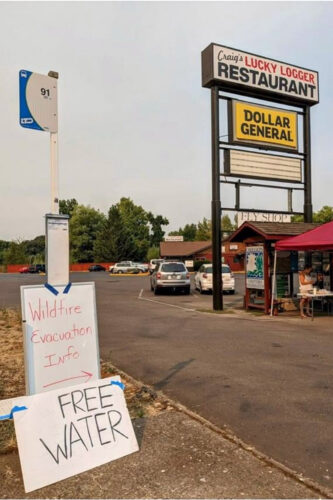
On August 7 lightning struck within the H.J. Andrews Experimental Forest near Lookout Cliff. In a little over a week, the Lookout Fire has grown to more than 1,200 acres and has moved toward the community of McKenzie Bridge, where a Level 3 evacuation order — “Leave now!” — was issued on August 13.
“We have lots of PTSD up here,” says Mary Ellen Wheeler, a recovery resource navigator for the McKenzie Valley Long Term Recovery Group (MVLTRG).
The 2020 Holiday Farm Fire ripped down the McKenzie Valley, starting in the community of Rainbow, which is just east of McKenzie Bridge, and burning 173,393 acres, destroying most of the community of Blue River and many other homes along the river. It was one of several Labor Day fires that devastated Oregon. According to the Oregon Forest Resources Institute, there was a gross economic impact of $8.488 billion from Labor Day Fires. Since then, people along the McKenzie River have been slowly navigating the bureaucratic mazes while trying to rebuild their homes and communities. But now they face the possibility of that work being undone by the Lookout Fire.
The recovery group was formed in 2021 to help people and organizations find and access resources while recovering from the fire. On August 14, the group set up a free dinner in Walterville for Lookout Fire evacuees. Devin Thompson, executive director of MVLTRG, tells Eugene Weekly that when the Level 3 evacuation notice got sent out to McKenzie Bridge, people were told to go to the Red Cross shelter that had been set up in Lowell for the Bedrock Fire. He pointed out, however, that the drive from McKenzie Bridge to Lowell was over an hour long, creating a massive barrier for people to access the resources at the shelter.
Brandi Ferguson of McKenzie Community Land Trust says that evacuees have been told if they seek overnight shelter, to check into the Red Cross shelter that it set up at Lowell High School. There is also a temporary evacuation point at McKenzie High School.
Unlike the Holiday Farm Fire, which immediately went to a Level 3 evacuation order, people in McKenzie Bridge had time to prepare to evacuate this time. But Shelly Pruitt, another recovery resource navigator for the long term recovery group, says that the emotional toll from experiencing a second fire in the area is tremendous.
“People will never be recovered from this fire. They will never be able to go back to what they were,” she says. “They’re just going, ‘I don’t know if I can do this again.’”
Pruitt continues, “The only thing that keeps me going is helping others. I’ve called a Realtor multiple times. It’s aged me a lot to recover.”
Members of MVLTRG reiterated that it’s been nice to have knowledge of what to do in disaster situations, but that it’s also been disappointing that there has been a lack of open lines of communication with Lane County.
“We’re all in one boat trying to accomplish the same things,” Thompson says. “We’d love for the county to be in the boat with us.”
The recovery group has been set up at Walterville Grange, which is now air-conditioned thanks to the help of the Oregon Department of Human Services. With help from volunteers, the center will be open from 8 am to 8 pm for evacuees and as a place for people to gather to get out of the smoke. Donations can be made to Locals Helping Locals, which is another McKenzie community-run nonprofit, and at mckenzievalleyltrg.org/donate. Checks and other physical items can be mailed to MVLTRG, PO Box 200, Blue River 97413.
MVLTRG cannot accept physical item donations at this time.
This story has been updated to clarify that that MVLTRG cannot accept the donations like socks and gift cards previously suggested. And to reflect the economic impact of the Labor Day Fires as opposed to the Holiday Farm Fire alone.